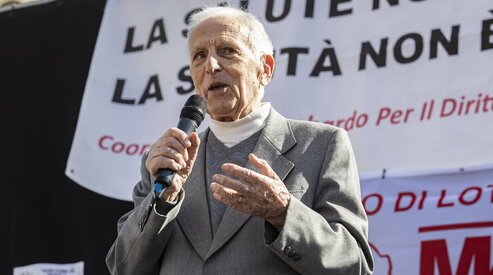Garattini: "Minister Schillaci should react to the appointments to the Vaccine Commission. It's an insult to COVID-19 victims."


(photo LaPresse)
the interview
The oncologist and founder of the Mario Negri Institute: "No-vax appointments, 'no' to the pandemic plan: now the government must change its approach to healthcare."
On the same topic:
"The appointment of two anti-vaccination doctors to the National Immunization Technical Advisory Group (NITAG), the Ministry of Health's committee for vaccination policies, is unthinkable. It's a true insult to those who died, suffered, and sacrificed themselves during Covid. I consider it an absolutely wrong decision, to which the minister lacked the courage to react ." Silvio Garattini , oncologist, pharmacologist, and one of the most renowned scientists in Italian academia, said this bluntly and diplomatically. He expressed his opposition to the appointment of former hematologist Paolo Bellavite and pediatrician Eugenio Serravalle, both highly critical of vaccines, to the National Immunization Technical Advisory Group (NIGAL) , which was approved by Health Minister Orazio Schillaci. "A committee that should prepare us for future pandemics. Yet if we had one today, a new pandemic, we'd be in the exact same situation as five years ago," Garattini, founder of the Mario Negri Institute, told Il Foglio. Is the government's healthcare populism worrying, as it seeks to emulate Trump's anti-scientific approach? " We need a change of direction. I find it unjustifiable to want to distance ourselves from the World Health Organization. I don't understand why we shouldn't also take advantage of what other countries have ."
Silvio Garattini, one of Italy's leading medical researchers, explains the mistake of appointing anti-vaxxers to the vaccination committee, as had already happened with the anti-vaxxer hearing in the parliamentary commission on Covid, this way: "Just as we prepare for an external attack by preparing barracks and a missile arsenal, we should prepare for a new pandemic with buildings and equipment that should be ready in case of need. Yet decisions like this demonstrate how little awareness there is of the need to prepare ahead of time," he explains to Il Foglio. This is evident, for example, in the government's freezing the appointment of the Director General of Emergencies at the Ministry of Health, who has jurisdiction over vaccines. But it is also evident in how the parliamentary debate over responsibility for managing the Covid emergency has become a club to be brandished at political opponents. "Commissions make sense if they achieve results quickly, not if they are used for political purposes that have little to do with science," Garattini argues. "To me, I must say this with utmost sincerity, it seems like we haven't learned anything from the past: from the 400,000 fewer surgical procedures, from the million and a half fewer screenings, from the deaths due to the inability to treat conditions caused by the spread of the virus. Well, it seems to me that the work of these commissions is more geared towards serving a few specific interests than truly clarifying what happened back then."
According to the founder of the Negri Institute, one of the most prestigious oncology research institutions in Italy, looking at Italy's positions in international forums, " the attitude we've taken toward the World Health Organization is unjustifiable. You can be as critical as you like about a given pandemic plan, but I don't understand why we shouldn't also take advantage of what other countries have. I believe opting out of that group is a grave mistake. We must not shy away from the international dimension ." The government's goal, perhaps, was to pursue the Trump administration's healthcare populism in the United States. "What worries me is that science is increasingly being left out of our education, our schools, our society," Garattini confesses with some dismay. I've heard some parliamentarians introduce a bill to transform pharmacies into the hub for patient care. But right now, pharmacies are a bazaar where you can find anything, without any medical supervision. You should completely overturn their educational function. Perhaps it would be better, for example, to have an hour of health education a week in schools. Why doesn't the minister think about that? So, does the right, which has freed itself from a populist approach in other fields, need to do the same in healthcare? "I certainly hope so," Garattini concludes. "Everyone can make mistakes, but then we have to try to fix them. I expect Minister Schillaci to block those unthinkable appointments."
More on these topics:
ilmanifesto





